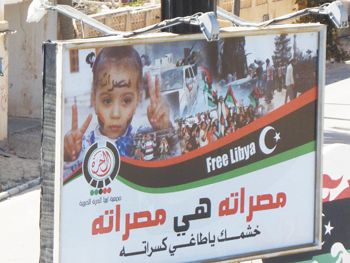Medical Relief for Libya

By Donald R. Olson, M.D.
October 6, 2011 - When I volunteered for this project through Medical Teams International - formally Northwest Medical Teams - in Portland, I had no idea what I was getting into. What I knew was that a revolution was going on, and the likelihood of neurosurgical casualties was high.
After taking a break from neurosurgery for the past 10 years, the idea of getting back into the operating room as a functional neurosurgeon was overwhelming. Battlefield surgery is never pretty; and certainly, this was the case in Libya.
The “Arab Spring,” which evolved from the demonstration of a single man burning himself to death in Tunisia, snaked through Egypt, and on Feb. 17, 2011, erupted in Libya.
The initial fight was in Benghazi, presented first with purely peaceful demonstrations, asking for liberty, flashing the two-fingered “V for Victory.” As the crowd grew larger, Moammar Gadhafi directed his troops to fire on his own people.
Gadhafi’s army, inside tanks armed with guns and weapons of mass destruction, erupted onto the scene with intent on killing. When NATO entered the fight, they successfully destroyed most of Gadhafi’s offensive in Benghazi and allowed time for a provisional government to evolve, sanctioning and providing credibility to the “Freedom Fighters.”
My mission was first to go to the field hospital at the front line, which I was denied for security reasons. The original hospital was destroyed, all of the mercenary Gadhafi doctors either left or were killed — as all of them were said to have been supported by Gadhafi. I was directed to a makeshift polyclinic to do neurosurgery on the freedom fighters being evacuated from the war still going on in Sirte.
The freedom fighters had moved into the central city, where they were ambushed. Back in Misrata, where almost all of the injured were taken, the emergency room, during a two-hour period, saw 167 casualties. All arrived on helicopters and in ambulances from Sirte. Roughly 30 had neurological injuries, two of which we took to the operating room that night.
Inside the emergency room, people were shoulder-to-shoulder, lots of chaos, but functional triage was ongoing, and doctors and nurses gave appropriate treatment.
Both patients I operated on had gunshot wounds to the head, one more serious than the other. The other neurosurgeon, from Tripoli, and me, plus two registrars, both from South Africa — both Libyans home for the war — made rounds together.
Death was everywhere. Directly outside the door of the emergency room were stacked coffins, made of wood and lined with metal. The coffins were placed in the back of the truck and then taken to a makeshift morgue nearby.
The staff from International Medical Corps (a partner with Medical Teams International) was outstanding. Our director of security at Misrata was a Jewish man born in Gaza, trained by Mossad, now under contract with MTI through the state department. He was always conscious of potential vulnerability, keeping our crew moving at all times, gathering only for post-midnight meetings in the guesthouse.
The people of Libya, particularly in Misrata, were wonderful. Citizens constantly thanked me for being there — they knew I was an American. They would thank President Obama, and indicated that it was because of the president’s rhetoric, and his theme for change, that they believed there was the entitlement of freedom for them. Thus inspired, they were willing to put their lives on the line against oppression and unbelievable odds, and stand up for freedom and change.
Aid now flows in from America. For example, a ship recently arrived in Tripoli carrying 52 pallets of medications. Submarines operate up and down the coastline, ensuring contraband from Iran or China, or other places, including weapons, are not allowed in. Only humanitarian aid gets through, and soley from people with the right identification.
Driving between Tripoli and Misrata, there were 32 checkpoints, with very serious people at each. Whenever the “blue M” was seen, we went through without further problems. Everybody waves, everybody says, “Thank you.”
After the heavy fighting and further bombardment in Sirte by the NATO forces, it was decided that the freedom fighters should pull back for a while to regroup and reorganize and allow civilians a chance to leave the city. Initially, only a few did; later, many joined the few.
As things slowed down, I proceeded to Benghazi to meet the staff of the developing rehab program. It has been decided, with IMC’s support, through a grant obtained through the UK of more than a million Euros, to set up a rehab program for the freedom fighters. Three parallel programs, one in Benghazi, one in Misrata and one in Tripoli, are to evolve. The one in Benghazi is said to be already functional at the large intact hospital known as the Benghazi Medical Center.
The week before I came to Libya, I attended an EMT course at Emmanuel Hospital in Portland. I spent time with a trauma neurosurgeon, learning about new methods of managing head injuries. They offered, at that time, to do a program in conjunction with Libya, once some stability had been achieved there, utilizing telemedicine — the use of telecommunication and information technologies in order to provide clinical health care at a distance.
Part of my motive for going to Benghazi was not only to see the new program, but also to find ways to apply telemedicine to the program and coordinate programs through an alliance with Portland. Linking Oregon into Benghazi, Tripoli and Misrata was the original goal.
With the use of satellites, telemedicine could create an instant educational system from America to Libya and around the world. Libya has all the equipment to do everything. What they don’t have is the knowledge to use that equipment. Just bringing pieces of equipment and/or medication into the country will solve nothing. Libya has enough money to do anything it wants. The issue is training the people, who have had no such opportunity. Telemedicine and recent teaching technologies through the Internet on a controlled security-wise basis could solve many problems. Everyone has a computer. Everyone has a G4 telephone.
With this as a background, much can be said about the future of Libya. There are beautiful beaches on the Mediterranean, a lovely climate on the coastline, empty resorts and ancient ruins from Greek and Roman days. Outside Benghazi is the great temple of Zeus, in the ancient city of Cyrene, which is beyond description. In the north, outside Tripoli, there is Leptis Magna and the Cleopatra centers, ruins going back 2000 years. Everything is magnificently preserved and totally unattended, unexploited.
For me, I want to return. I have a lot of thoughts, memories and ideas for the future. I actually think I did some good in Libya.
Note: Oct. 20, 2011, Gadhafi was captured and killed. Today, Libya is free.
Dr. Donald R. Olson, MD, MBA, is the owner of Torii Mor Winery, located in Dundee, as well the a clinical professor in the Department of Neurosurgery at OHSU in Portland.







